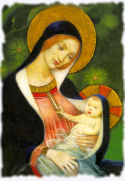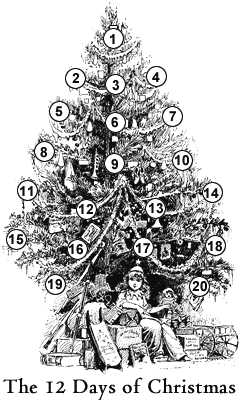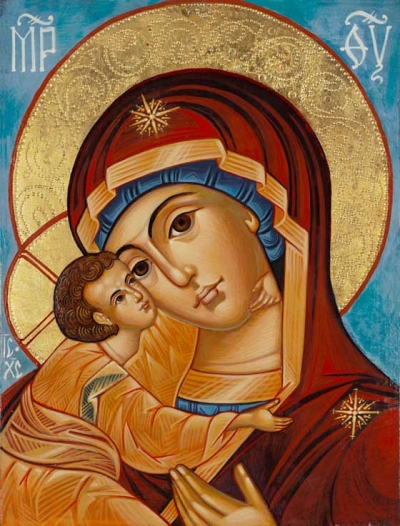16. And they came with haste, and found Mary, and Joseph, and the babe lying in a manger.
17. And when they had seen it, they made known abroad the saying which was told them concerning this child.
18. And all they that heard it wondered at those things which were told them by the shepherds.
19. But Mary kept all these things, and pondered them in her heart.
20. And the shepherds returned, glorifying and praising God for all the things that they had heard and seen, as it was told to them.
GREEK EX. The shepherds were filled with astonishment at the things that they saw and heard, and so they left their sheepfolds, and set out by night to Bethlehem, seeking for the light of the Savior; and therefore it is said, They spoke one to another, &c.
THEOPHYL; As men who were truly watching, they said not, Let us see (the child; but) the word which has come to pass, i.e. the Word which was from the beginning, let us see how it has been made flesh for us, since this very Word is the Lord. For it follows, Which the Lord has made, and has shown to us; i.e. Let us see how the Lord has made Himself, and has shown His flesh to us.
AMBROSE; How remarkably Scripture weighs the import of each word. For when we behold the flesh of the Lord, we behold the Word, which is the Son. Let not this seem to you a slight example of faith, because of the humble character of the shepherds. For simplicity is sought for, not pride. It follows, And they came in haste. For no one indolently seeks after Christ.
ORIGEN; But because they came in haste, and not with loitering steps, it follows, They found Mary, (i.e. her who had brought Jesus into the world,) and Joseph, (i.e. the guardian of our Lord's birth,) and the babe lying in the manger, (i.e. the Savior Himself.)
THEOPHYL; It seems to succeed in due order, that after having rightly celebrated the incarnation of the Word, we should at length come to behold the actual glory of that Word. Hence it follows: But when they saw it, they made known the word which had been spoken to them.
GREEK EX. Beholding with hidden faith indeed the happy events which had been told them, and not content with marveling at the reality of those things which at the very first they saw and embraced when the Angel told them, they began to relate them not only to Mary and Joseph, but to the others also (and what is more they impressed them on their minds,) as it follows, And all who heard it marveled. For how could it be otherwise, at the sight of one of the heavenly host upon earth, and earth in peace reconciled to heaven; and that ineffable Child binding together in one, by His divinity, heavenly things, by His humanity, earthly things, and by this conjunction of Himself ejecting a wonderful union!
GLOSS. Not only do they marvel at the mystery of the incarnation, but also at so wonderful an attestation of the shepherds, men who could not have devised these unheard of things, but were with simple eloquence proclaiming the truth.
AMBROSE; Esteem not the words of the shepherds as mean and despicable For from the shepherds Mary increases her faith, as it follows: Mary kept all these sayings, and pondered them in her heart. Let us learn the chastity of the sacred Virgin in all things, who no less chaste in her words than in her body, gathered up in her heart the materials of faith.
THEOPHYL; For keeping the laws of virgin modesty, she who had known the secrets of Christ would divulge them to no one, but comparing what she had read in prophecy with what she now acknowledged to have taken place, she did not utter them with the mouth, but preserved them shut up in her heart.
GREEK EX. Whatever the Angel had said to her, whatever she had heard from Zacharias, and Elisabeth, and the shepherds, she collected them all in her mind, and comparing them together, perceived in all one harmony. Truly, He was God who was born from her.
ATHANAS. But every one rejoiced in the nativity of Christ, not with human feelings, as men are wont to rejoice when a son is born, but at the presence of Christ and the luster of the Divine light. As it follows: And the shepherds returned, glorifying and praising God for every thing they had heard, &c.
THEOPHYL; That is to say, from the Angels, and had seen, i.e. in Bethlehem, as it was told them, i.e. they glory in this, that when they came they found it even as it was told them, or as it was told them they give praise and glory to God. For this they were told by the Angels to do, not in very word commanding them, but setting before them the form of devotion when they sung glory to God in the highest.
THEOPHYL; To speak in a mystery, let the shepherds of spiritual flocks, (nay, all the faithful,) after the example of, these shepherds, go in thought even to Bethlehem, and celebrate the incarnation of Christ with due honors. Let us go indeed casting aside all fleshly lusts, with the whole desire of the mind even to the heavenly Bethlehem, (i.e. the house of the living bread,) that He whom they saw crying in the manger we may deserve to see reigning on the throne of His Father. And such bliss as this is not to be sought for with sloth and idleness, but with eagerness must we follow the footsteps of Christ. When they saw Him they knew Him; and let us haste to embrace in the fullness of our love those things which were spoken of our Savior, that when the time shall come that we shall see with perfect knowledge we may be able to comprehend them.
THEOPHYL; Again, the shepherds of the Lord's flock by contemplating the life of the fathers who went before them, (which preserved the bread of life,) enter as it were the gates of Bethlehem, and find therein none other than the virgin beauty of the Church, that is, Mary; the manly company of spiritual doctors, that is, Joseph; and the lowly coming of Christ contained in the pages of Holy Scripture, that is, the infant child Christ, laid in the manger.
ORIGEN; That was the manger which Israel knew not, according to those words of Isaiah, The ox knows his owner, and the ass his master's crib.
THEOPHYL; The shepherds did not hide in silence what they knew, because to this end have the Shepherds of the Church been ordained, that what they have learned in the Scriptures they might explain to their hearers.
THEOPHYL; The masters of the spiritual flocks also, while others sleep, at one time by contemplation enter into the heavenly places, at another time pass around them by seeking the examples of the faithful, at another time by teaching return to the public duties of the pastoral office.
THEOPHYL; Every one of us, even he who is supposed to live as a private person, exercises the office of shepherd, if, keeping together a multitude of good actions and pure thoughts, he strive to rule them with due moderation, to feed them with the food of the Scriptures, and to preserve them against the snares of the devil.
21. And when eight days were accomplished for the circumcising of the child, his name was called JESUS, which was so named of the angel before he was conceived in the womb.
THEOPHYL; Having related our Lord's nativity, the Evangelist adds, And after that eight days were accomplished for the circumcision of the child.
AMBROSE; Who is this Child, but He of whom it was said, Unto us a child is born, unto us a son is given? For He was made under the law, that He might redeem them who were under the law.
EPIPH. Now the followers of Ebion and Cerinthus say, "It is enough for a disciple if he be as his Master. But Christ circumcised Himself. Be you therefore circumcised." But herein do they deceive themselves, destroying their own principles; for if Ebion should confess that Christ as God descended from heaven and was circumcised on the eighth day, it might then afford the ground of an argument for circumcision; but since he affirms Him to be mere man, surely as a boy he cannot be the cause of Himself being circumcised, as neither are infants the authors of their own circumcision. But we confess that it is God Himself who has descended from heaven, and that enclosed in a virgin's womb, He abode there the whole time necessary for her delivery, until He should perfectly form to Himself of the virgin's womb a human body; and that in this body He was not in appearance but truly circumcised on the eighth day, in order that the figures having come to this spiritual fulfillment, both by Himself and His disciples, might now be spread abroad no longer the figures but the reality.
ORIGEN; As we have died with Him at His death, and risen together with Him at His resurrection, so with Him have we been circumcised, and therefore need not now circumcision in the flesh.
EPIPHAN. Christ was circumcised for several reasons. First indeed to show the reality of His flesh, in opposition to Manichaus and those who say that He came forth in appearance only. Secondly, that He might prove that His body was not of the same substance with the Deity, according to Apollinaris, and that it descended not from heaven, as Valentinian said. Thirdly, to add a confirmation to circumcision which He had of old instituted to wait His coming. Lastly, to leave no excuse to the Jews. For had He not been circumcised, they might have objected that they could not receive Christ uncircumcised.
THEOPHYL; He was circumcised also that He might enjoin upon us by His example the virtue of obedience and might take compassion on them who being placed under the law, were unable to bear the burdens of the law, to the end that He who came in the likeness of sinful flesh might not reject the remedy with which sinful flesh was wont to be healed. For circumcision brought in the law the same assistance of a saving cure to the wound of original sin which Baptism does in the time of the grace of revelation, except that as yet the circumcised could not enter the gates of the heavenly kingdom, but comforted after death with a blessed rest in Abraham's bosom, they waited with a joyful hope for their entrance into eternal peace.
ATHAN. For circumcision expressed nothing else, but the stripping off of the old birth, seeing that part was circumcised which caused the birth of the body. And thus it was done at that time as a sign of the future baptism through Christ. Therefore as soon as that of which it was a sign came, the figure ceased. For since the whole of the old man Adam is taken away by baptism, there remains nothing which the cutting of a part prefigures.
CYRIL; It was the custom on the eighth day to perform the circumcision of the flesh. For on the eighth day Christ rose from the dead, and conveyed to us a spiritual circumcision, saying, Go and teach all nations, baptizing them.
THEOPHYL; Now in His resurrection was prefigured the resurrection of each of us both in the flesh and the Spirit, for Christ has taught us by being circumcised that our nature must both now in itself be purged from the stain of vice, and at the last day be restored from the plague of death. And as the Lord rose on the eighth day, i.e. the day after the seventh, (which is the Sabbath,) so we also after six ages of the world and after the seventh, which is the rest of souls, and is now carrying on in another life, shall rise as on the eighth day.
CYRIL; But according to the command of the law, on the same day He received the imposition of a name, as it follows, His name was called Jesus which is interpreted Savior. For He was brought forth for the salvation of the whole world, which by His circumcision He prefigured, as the Apostle says to the Colossians, "you are circumcised with a circumcision made without hands, in the stripping off of the body of the flesh, to wit, the circumcision of Christ."
THEOPHYL; That upon the day of His circumcision He also received the imposition of the name was likewise done in imitation of the old observances. For Abraham, who received the first sacrament of circumcision, was on the day of his circumcision thought worthy to be. blessed by the increase of his name.
ORIGEN; But the name of Jesus, a glorious name and worthy of all honor, a name which is above every other, ought not first to be uttered by men, nor by them be brought into the world. Therefore significantly the Evangelist adds, which was called of the Angel, &c.
THEOPHYL; Of this name the elect also in their spiritual circumcision rejoice to be partakers, that as from Christ they are called Christians, so also from the Savior they may be called saved, which title was given them of God not only before they were conceived through faith in the womb of the Church, but even before the world began.
Catena Aurea Luke 2









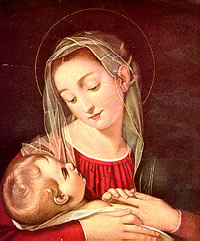
 A plenary indulgence may be gained by reciting or singing the hymn
A plenary indulgence may be gained by reciting or singing the hymn  The solemnity of 1 January, an eminently Marian feast, presents an excellent opportunity for liturgical piety to encounter popular piety: the first celebrates this event in a manner proper to it; the second, when duly catechised, lends joy and happiness to the various expressions of praise offered to Our Lady on the birth of her divine Son, to deepen our understanding of many prayers, beginning with that which says: "Holy Mary, Mother of God, pray for us, sinners."
The solemnity of 1 January, an eminently Marian feast, presents an excellent opportunity for liturgical piety to encounter popular piety: the first celebrates this event in a manner proper to it; the second, when duly catechised, lends joy and happiness to the various expressions of praise offered to Our Lady on the birth of her divine Son, to deepen our understanding of many prayers, beginning with that which says: "Holy Mary, Mother of God, pray for us, sinners." 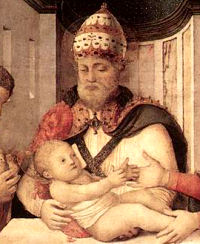 The old liturgy celebrated three feasts in one. The first was that which the old Roman sacramentaries called "the octave of the Lord," and indeed the greater part of the Mass was of the octave of Christmas with many extracts from the Masses of Christmas. Various portions of the Mass and Office celebrated the divine maternity of Mary. The third feast was that of the Circumcision which has been celebrated since the sixth century. Eight days after His birth Christ underwent, like all the Jews, this rite enjoined on Abraham by God as a pledge of his faith, and He received the name of Jesus.
The old liturgy celebrated three feasts in one. The first was that which the old Roman sacramentaries called "the octave of the Lord," and indeed the greater part of the Mass was of the octave of Christmas with many extracts from the Masses of Christmas. Various portions of the Mass and Office celebrated the divine maternity of Mary. The third feast was that of the Circumcision which has been celebrated since the sixth century. Eight days after His birth Christ underwent, like all the Jews, this rite enjoined on Abraham by God as a pledge of his faith, and He received the name of Jesus. 
